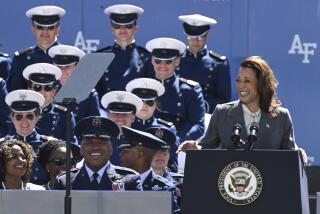Rice to go to Kenya to offer U.S. help in crisis
- Share via
WASHINGTON — On the eve of his second trip to sub-Saharan Africa, President Bush announced Thursday that he will dispatch Secretary of State Condoleezza Rice to Kenya, a fresh sign of U.S. concern about the political discord that has troubled the East African nation.
Bush has come under pressure to involve his administration in efforts to stem the violence in Kenya, until weeks ago considered one of the most stable democracies in Africa.
Analysts speculated that Bush decided to send Rice to Kenya to defuse criticism that his six-day itinerary skirts troubled states and highlights successes. Bush is scheduled to depart today to visit the relatively stable countries of Benin, Tanzania, Rwanda, Ghana and Liberia.
“There is growing criticism that the theme of this trip is, ‘Aren’t things rosy?’ and that the president will be ducking the crises and tough issues,” said J. Anthony Holmes, a former State Department official with the Council on Foreign Relations.
Rice will split off from Bush’s party Monday and fly to Nairobi to meet with Kenyan leaders and former United Nations Secretary-General Kofi Annan, who is trying to work out a power-sharing deal between President Mwai Kibaki and opposition Orange Democratic Movement leader Raila Odinga. The dispute has left more than 1,000 people dead since the Dec. 27 election.
Bush said Rice would “deliver a message directly to Kenya’s leaders and people: There must be an immediate halt to violence, there must be justice for the victims of abuse, and there must be a full return to democracy.”
Analysts say there is a limit to how much the administration will become involved. Both the Bush and Clinton administrations pursued a policy of urging African nations to solve their own problems with limited U.S. assistance. But the U.S. has important security interests in Kenya, which has cooperated in fighting Muslim extremism in the region.
In a speech Thursday at the Smithsonian Institution’s National Museum of African Art, Bush outlined a broad U.S. role in Africa that would last beyond the end of his administration. He highlighted an agenda to promote economic and political development and expand a massive campaign against HIV/AIDS and malaria.
Bush sought to assure Africans that “the United States is committed to them today, tomorrow and long into their continent’s bright future.”
“Africa in the 21st century is a continent of potential,” he said, “where democracy is advancing, where economies are growing, and leaders are meeting challenges with purpose and determination.”
Bush’s first visit to sub-Saharan Africa as president, in 2003, took him to two of the continent’s economic heavyweights, South Africa and Nigeria, among other stops. The countries he will visit on this trip were chosen to highlight economic and political successes.
Gayle Smith, who oversaw National Security Council work on Africa during the final years of the Clinton administration, estimated that peacekeeping operations were underfunded by as much as $600 million.
Holmes, a 28-year veteran of the U.S. Foreign Service, said, “The focus of this trip is legacy, legacy, legacy. They really want to highlight and enshrine what the president has accomplished.”
The administration’s primary health initiative in Africa, the anti-AIDS and malaria program, is seen as the largest international health campaign in history.
“He has put his money where his mouth is,” Holmes said, but “there is much more the United States could do.”
The $18-billion emergency program for AIDS relief will be one of the central themes of the trip. Bush is seeking a new five-year outlay of $30 billion.
Bush said that when he visited Africa five years ago, 50,000 people were receiving medicine to treat HIV/AIDS. Now, he said, more than 1.3 million people are being treated, and the program has benefited tens of millions of people on the continent.
“Some call this a remarkable success,” he said. “I call it a good start.”
--
james.gerstenzang @latimes.com
Times staff writer Paul Richter contributed to this report
More to Read
Sign up for Essential California
The most important California stories and recommendations in your inbox every morning.
You may occasionally receive promotional content from the Los Angeles Times.













